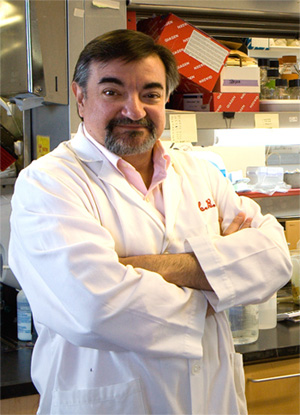Patients with kidney cancer have one option to beat their disease - surgery to remove the organ

But this situation may change thanks to a new compound found by researchers from Stanford University School of Medicine and which is able to destroy cancerous kidney cells. Ideally, the researchers say, a drug developed from this compound would help fight this life-threatening disease without harming the patient's kidneys.
"You now have a possible means of fighting a disease that until now has been difficult to treat," says Professor Amato Giaccia, director of the Departments of Oncology and Radiological Biology at the School of Medicine. His findings were published in the journal Cancer Cell in July.
The researcher says that his laboratory focused on carcinoma (malignant tumor) cells of the kidney or in the more familiar year - kidney cancer - because there is no known cure for it other than excision of the malignant part of the patient's body. "There are currently no effective chemotherapy treatments to combat this type of cancer," says the lead researcher, "and patients still die as a result."
Almost fifty-five thousand people will be diagnosed with kidney cancer in the US this year, and about thirteen thousand of them will die from it, according to the American Cancer Society. Radiotherapy, a powerful tool to fight cancer, was found to be ineffective in eliminating kidney cancer cells, unlike other types of cancer, says the researcher.
This new research could lead to the development of a treatment that would prevent patients from losing one of their two kidneys. Among their other functions, these organs are responsible for filtering the blood, controlling blood pressure and preventing anemia.
The study focused on a gene called von Hippel-Lindau, or VHL, which suppresses cancer and normally slows tumor development in humans but does not work that way in seventy-five percent of kidney cancer cells. The research team was looking for a small compound that could destroy cancer cells when this gene is broken. They found the solution in a compound called STF-62247. While this compound is toxic to cancerous kidney cells, it is usually harmless to the other cells in the human body that carry the active VHL gene, says the lead researcher. As another advantage, the researcher explains, patients who will be treated with this drug will not suffer from the terrible side effects of chemotherapy, such as nausea and hair loss, because the compound is not toxic to the entire body, except for the kidneys. Clinical trials of this drug will be able to begin in the coming years, the researcher hopes. Dr. Denise A. Chan, one of the partners for the research and the article believes that their new findings will be able to influence the future treatments of all types of cancer.
This study is one of the first to identify a unique characteristic of a certain type of cancer - in this case the VHL gene is defective in kidney cancer - and to use this characteristic to defeat the disease, says the researcher. She predicts that soon more scientists will follow in their footsteps and look for unique characteristics in other types of cancer that can be used to fight the disease. The motivation of the researchers could be twofold, say the authors of the article: finding a cure for deadly types of cancer and avoiding the debilitating side effects caused by most current cancer treatments. "These results can have effects far beyond kidney cancer," states the researcher.
The high-throughput equipment available at the university can test the toxicity of thousands of compounds at the same time, allowing researchers such as those in Giaccia's lab to search for and find genes and compounds hidden from view, which previously would only be found after arduous, exhausting and slow work.
The announcement of the researchers from Stanford University

4 תגובות
Sounds good even if it's not certain and if it's for a few more years.
What type of colon cancer is this? Does it include chromophobe RCC?
Where can I find a link to the original article?
Is it possible to selectively remove Knesset members?
Well done… I wish it would work well
Pretty.